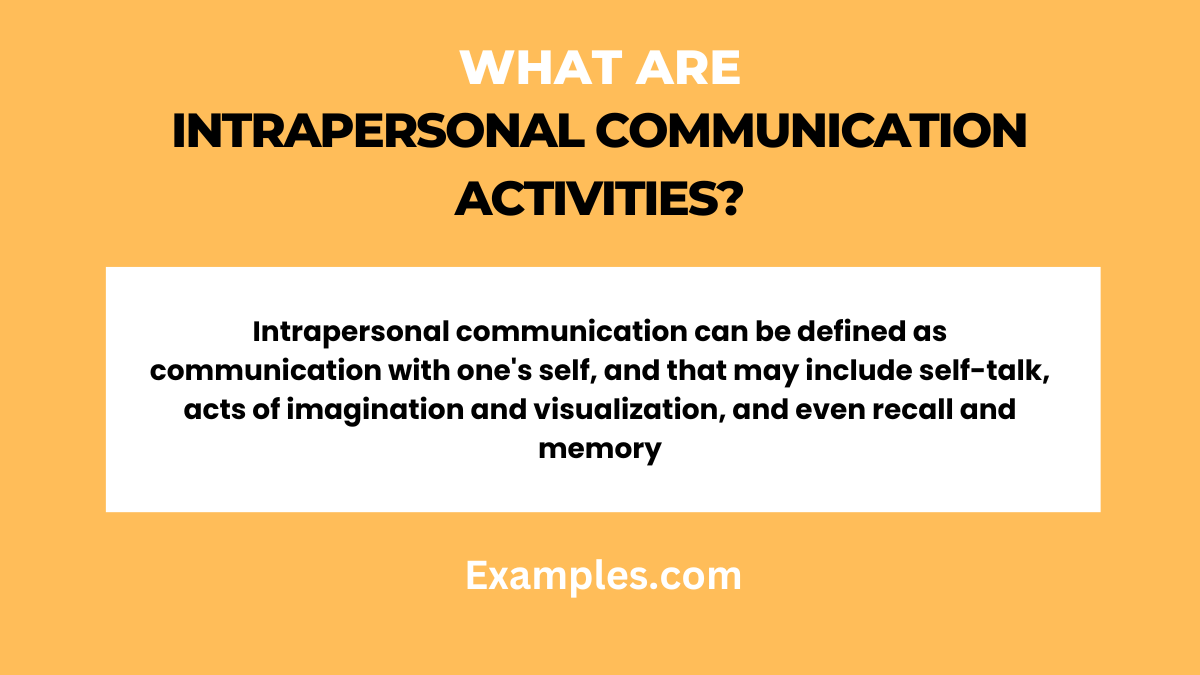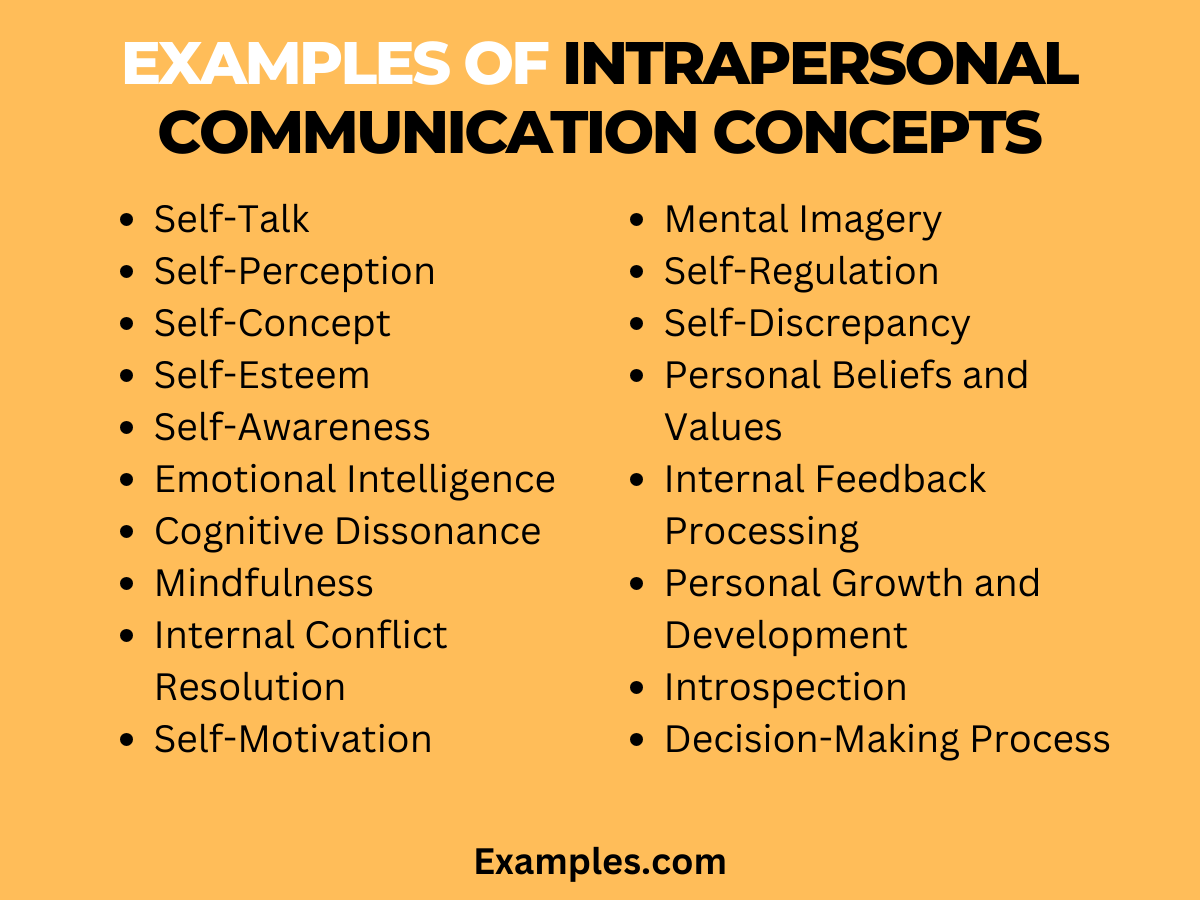19+ Intrapersonal Communication Concepts Examples
Embark on a journey through the world of Intrapersonal Communication Concepts with our comprehensive guide. Delve into the intricate workings of your internal dialogue, exploring key concepts like self-awareness, emotional intelligence, and mindfulness. Packed with Intrapersonal Communication Examples, this guide is designed to provide a deeper understanding of how you communicate with yourself, fostering personal growth, better decision-making, and enhanced emotional well-being. Uncover the secrets of your inner world and transform your intrapersonal skills.
What are Intrapersonal Communication Activities?

Intrapersonal communication activities are exercises or tasks that you do to improve how you talk and listen to yourself. These activities help you understand your own thoughts, feelings, and reactions better. They include things like journaling, setting personal goals, and practicing mindfulness. By doing these activities, you can improve your intrapersonal communication skills, which means you get better at understanding your own emotions and thoughts, making better decisions, and feeling more confident in yourself.
20 Examples of Intrapersonal Communication Concepts

Intrapersonal communication concepts are essential components of our internal dialogue. They shape how we perceive ourselves, make decisions, and interact with the world around us. Here are 20 key concepts in intrapersonal communication, each explained in detail with an example to illustrate their significance in everyday life.
- Self-Talk This is the internal dialogue that influences our thinking and behavior. It can be positive or negative and significantly affects our mindset and actions.
- Example: Telling yourself, “I can overcome this challenge,” to boost confidence in difficult times.
- Self-Perception This concept involves how we view and understand ourselves, influencing our identity, actions, and interactions with others.
- Example: Believing you are an empathetic person, you often find yourself helping others in need.
- Self-Concept Our overall idea of who we are, shaped by personal experiences, beliefs, and perceptions, forms our self-concept, affecting how we present ourselves to the world.
- Example: Seeing yourself as a creative individual, you often seek artistic ways to express yourself.
- Self-Esteem Self-esteem is our emotional evaluation of our own worth, impacting our confidence and overall well-being.
- Example: Feeling a sense of pride and accomplishment after successfully completing a project.
- Self-Awareness Being aware of one’s own thoughts, feelings, and actions is crucial for personal growth and how we respond to various situations.
- Example: Recognizing your tendency to procrastinate, you create strategies to manage your time more effectively.
- Emotional Intelligence The ability to understand and manage one’s own emotions, as well as empathize with others, is critical for effective interpersonal interactions and personal well-being.
- Example: Noticing a coworker is upset, you offer support, demonstrating your understanding of their emotional state.
- Cognitive Dissonance Experiencing mental discomfort when holding two conflicting beliefs, cognitive dissonance often prompts us to seek consistency between our beliefs and actions.
- Example: Feeling unsettled about enjoying fast food despite valuing healthy eating, you consider changing your diet.
- Mindfulness Maintaining awareness of our present thoughts, feelings, and environment without judgment enhances mental clarity and reduces stress.
- Example: Practicing mindfulness, you focus on your breathing during a stressful moment, finding calmness.
- Internal Conflict Resolution This involves resolving personal dilemmas and contradictions within oneself, balancing different aspects of personality, desires, and needs.
- Example: Deciding whether to prioritize a lucrative career opportunity or a fulfilling personal relationship.
- Self-Motivation The internal drive to initiate and continue tasks without external incentives relies on personal desire and ambition.
- Example: Working on a personal project late at night, driven by your passion rather than external rewards.
- Personal Goal Setting Defining personal aspirations and planning steps towards achieving them helps direct our actions and thoughts towards meaningful objectives.
- Example: Setting a goal to improve public speaking skills and enrolling in a course to achieve it.
- Self-Reflection Contemplating one’s actions and experiences allows for learning and growth, leading to a deeper understanding of oneself.
- Example: Reflecting on a disagreement with a friend, you realize how your words may have been hurtful.
- Mental Imagery Using imagination to visualize specific behaviors or outcomes can positively influence our actions and boost confidence.
- Example: Visualizing a successful outcome of a challenging task to alleviate anxiety and increase self-assurance.
- Self-Regulation Controlling and adjusting our emotions and behavior in response to situational demands is key to adapting to various challenges.
- Example: Feeling angered in a debate but choosing to respond calmly and constructively.
- Self-Discrepancy The gap between our actual self and our ideal or ought self often motivates personal growth and change.
- Example: Striving to be more organized and disciplined to match your ideal self-image.
- Personal Beliefs and Values The core principles that guide our decisions, actions, and responses significantly influence our personality and life choices.
- Example: Prioritizing a job that aligns with your value of helping others, even if it pays less.
- Internal Feedback Processing Interpretation and utilization of personal feedback are essential for self-improvement and adjusting behaviors or attitudes.
- Example: Using feedback from a performance review to develop new professional skills.
- Personal Growth and Development This ongoing process involves enhancing oneself to achieve one’s potential and aspirations, seeking new experiences, and learning.
- Example: Taking up a new hobby, such as painting, to explore and develop your creative side.
- Introspection Deliberate examination of one’s thoughts and feelings leads to greater self-understanding and insight into personal motivations.
- Example: Analyzing why certain situations trigger feelings of insecurity and working on those feelings.
- Decision-Making Process The method of making choices by assessing information and considering alternatives is crucial in everyday life and long-term planning.
- Example: Researching extensively and comparing options before making a significant investment or purchase.
What are the 5 Concepts of Intrapersonal Communication?

Intrapersonal communication involves more than just the conversations we have with ourselves; it encompasses a variety of concepts that shape our internal dialogue. Understanding these concepts is key to enhancing intrapersonal communication skills and overall personal development. Here, we delve into the five core concepts of intrapersonal communication, each vital to self-awareness and emotional intelligence.
- Self-Awareness Self-awareness is the foundation of intrapersonal communication. It involves being conscious of your thoughts, feelings, and actions. This awareness is crucial for understanding personal strengths, weaknesses, and emotional triggers.
- Self-Regulation Self-regulation refers to managing and adapting your emotions and behaviors in response to different situations. This concept is essential for maintaining emotional balance and making reasoned decisions.
- Self-Concept Self-concept is the overall perception of who you are, based on your beliefs, experiences, and self-perception. It shapes your identity and influences how you interact with the world.
- Self-Esteem Self-esteem is the emotional evaluation of your own worth. High self-esteem fosters confidence and resilience, while low self-esteem can lead to insecurity and self-doubt.
- Self-Motivation Self-motivation drives you to pursue goals and tasks without external influence. It’s fueled by personal desires, aspirations, and the internal reward system.
Intrapersonal Communication Concepts in the Workplace

In the context of the workplace, intrapersonal communication concepts play a significant role in shaping professional interactions, job performance, and career development. These concepts are integral to intrapersonal communication in the workplace, influencing everything from leadership to teamwork.
- Emotional Intelligence Emotional intelligence in the workplace involves understanding and managing your emotions and those of your colleagues. It’s crucial for effective communication, conflict resolution, and teamwork.
- Professional Self-Concept How employees perceive themselves professionally affects their performance, ambitions, and interactions. A positive professional self-concept boosts confidence and job satisfaction.
- Decision-Making Process The decision-making process is a key intrapersonal concept in the workplace. It involves weighing options, considering potential outcomes, and making choices that align with professional goals.
- Workplace Stress Management Managing stress through intrapersonal communication techniques like mindfulness and self-regulation can lead to better mental health and productivity in the workplace.
- Career Development and Goal Setting Setting and pursuing career goals is an essential aspect of intrapersonal communication in a professional setting. It involves self-reflection, ambition, and the drive to achieve professional aspirations.
In conclusion, mastering intrapersonal communication is vital for personal growth and self-awareness. By understanding and practicing these concepts, individuals can enhance their self-reflection, decision-making, and emotional intelligence. This guide offers practical tips to effectively develop these skills, ensuring a more mindful and fulfilling life journey. Embrace these strategies for a stronger, more introspective self.



